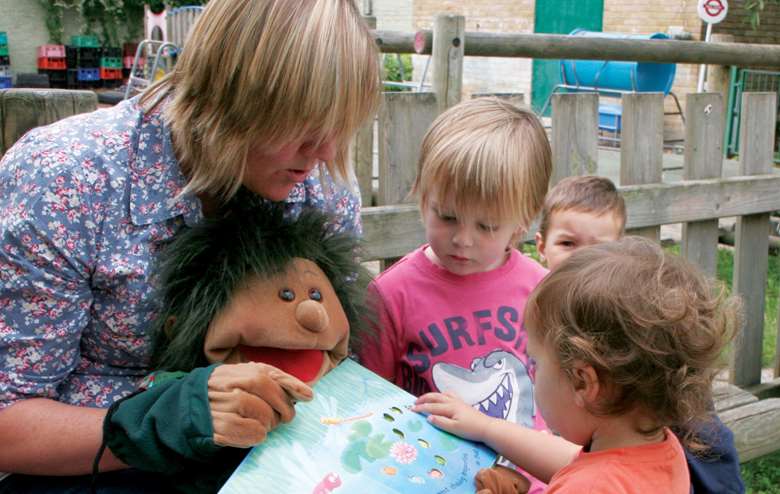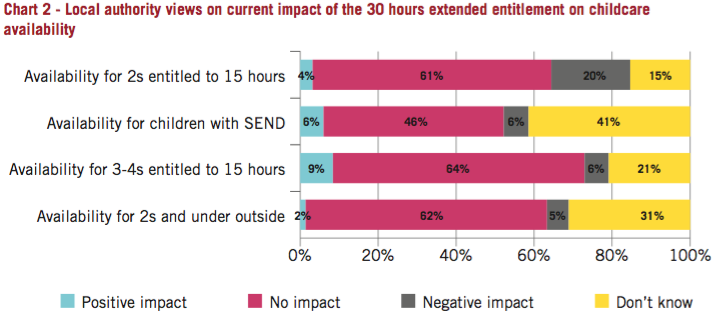30 hours offer hitting childcare places for disadvantaged two-year-olds
Joe Lepper
Thursday, February 28, 2019
The government's 30 hours funded childcare offer is leaving early years providers struggling financially and is limiting the number of places available to the most disadvantaged children, councils have warned.

A Coram Family and Childcare survey of local authorities found widespread concerns that the 30-hour offer, introduced in September 2017 to three- and four- year-olds of working parents, is affecting the long-term future of early years settings.
It found that 36 per cent of councils believe the 30-hour entitlement is having a negative impact on the financial sustainability of childcare providers.
A fifth of councils also believe it is having a negative impact on the availability of 15 hours of funded childcare for disadvantaged two-year-olds.
In addition, six per cent believe it is having a negative impact on the availability of places for children with special educational needs and disabilities (SEND).
The survey findings come amid concern by early years leaders about a lack of funding for the 30 hours entitlement, which they say is leaving providers having to make up the shortfall through fee hikes.
The organisation found that fees have risen by three per cent over the last year, with parents paying an average of £127 a week, the equivalent of £6,000 a year.
One in four councils surveyed believed that the 30 hours extension is pushing up prices for three- and four- year-olds outside of funded entitlements.

Purnima Tanuku, National Day Nurseries Association (NDNA) chief executive said: "The government claims it offers three- and four-year-olds ‘free' childcare hours, but then does not pay enough to cover delivery costs.
"Coram Family and Childcare's research echoes our own findings, that nurseries and parents are paying the price for this shortfall in funding with higher fees for under threes or places being limited."

Early Years Alliance chief executive Neil Leitch added: "Given that childcare funding continues to fail to meet the costs of delivering funded places, it comes as no surprise that we are seeing costs across the country continuing to rise - though given the current pressure on the sector, providers have done well to limit the increases to the levels outlined in this report.
"Since current funding rates were set in 2015, early years providers have endured rising wage and pensions obligations, as well as business rate rises, mortgage and rent hikes and countless other cost increases. As such, many have been forced to increase fees just to keep their heads above water, and this has had a particular impact on parents with younger children who aren't eligible for the funded schemes.
"This issue has only been exacerbated by the introduction of the 30 hours scheme, and local authorities are right to warn that this policy is not only causing prices to rise, but also having a negative impact on the financial sustainability of childcare settings."
Earlier this month, the education select committee published a critical report of the 30 hours funded childcare offer, which it labelled "perverse" for worsening disadvantage.
A Department for Education survey of councils in December last year also raised concerns that the 30 hours entitlement for working families was reducing the availability of places for disadvantaged two-year-olds.
Coram Family and Childcare is urging the government to look at how childcare spending can be reallocated to better meet the needs of disadvantaged children.
It also wants to see the 30 hours entitlement extended to parents who are undertaking training, to help low income families improve their employability.
In addition, grants should be made available to help early years settings broaden their provision to offer more places to children with disabilities, older children and those living with parents who work outside of 9am to 5pm hours.
"Childcare is every bit as vital as schools, healthcare or transport: it supports parents to work, provides our economy with a reliable workforce and boosts children's outcomes," said Coram Family and Childcare head Megan Jarvie.
"But too many parents remain locked out of work by high childcare costs and low availability, and too many children miss out on high quality childcare, and the benefits to their life-chances that come with it."
A DfE spokeswoman said: "Next year we will be spending a record amount on childcare support - around £6 billion a year, including funding for our free early education offers on which we will spend around £3.5 billion this year alone.
"More than 700,000 of the most disadvantaged two-year-olds have benefited from 15 hours free childcare since 2013, and more than 340,000 three- and four-year-olds benefitted from our 30 hours offer in its first year, meaning parents are spending less on childcare or are able to work more flexibly."




